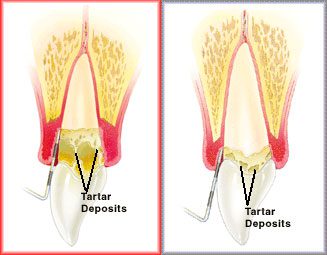Oral Surgery: Pocket Reduction or Osseous Surgery

At LK Anderson DDS & Periodontics in Wichita, we offer osseous surgery to treat the effects of gum disease. Your bone and gum tissue should fit snugly around your teeth like a turtleneck around your neck. When you have periodontal disease, this supporting tissue and bone is destroyed, forming “pockets” around the teeth.
Gum disease, also known as periodontal disease, is a common dental problem that affects the gums, bones, and other structures that support your teeth. It is caused by the buildup of bacteria and plaque on and around the teeth, which can lead to inflammation and infection.
How Gum Disease Progresses
The earliest stage of gum disease is called gingivitis. At this stage, the gums may be red, swollen, and bleed easily when you brush or floss your teeth. Gingivitis is reversible with proper oral hygiene and regular dental cleanings.
If left untreated, however, gingivitis can progress to a more severe form of gum disease called periodontitis. In periodontitis, the gums pull away from the teeth, creating pockets that become infected with bacteria. The body’s immune system responds by breaking down the bone and connective tissue that hold the teeth in place.
Over time, this can lead to tooth loss and other serious dental problems. In fact, periodontitis is the leading cause of tooth loss in adults.
In some cases, non-surgical treatments such as scaling and root planing (deep cleaning) can be effective in treating periodontitis. However, in more advanced cases, a surgical procedure called osseous surgery may be necessary.
The Damage Gum Disease Can Do
Over time, these pockets become deeper, providing a larger space for bacteria to live. As bacteria develop around the teeth, they can accumulate and advance under the gum tissue. These deep pockets collect even more bacteria, resulting in further bone and tissue loss. Eventually, if too much bone is lost, the teeth will need to be extracted.

Osseous Surgery for Gum Health
Osseous surgery involves removing the infected tissue and bacteria from the pockets around the teeth, and reshaping the bone and gum tissue to better support the teeth. This can help prevent further bone loss and improve the overall health of your gums and teeth.
During this oral surgery procedure, your periodontist folds back the gum tissue and removes the disease-causing bacteria before securing the tissue into place. In some cases, irregular surfaces of the damaged bone are smoothed to limit areas where disease-causing bacteria can hide. This allows the gum tissue to better reattach to healthy bone.
Reducing pocket depth and eliminating existing bacteria are important to prevent damage caused by the progression of periodontal disease and to help you maintain a healthy smile. Eliminating bacteria alone may not be sufficient to prevent disease recurrence.
Deeper pockets are more difficult for you and your dental care professional to clean, so it’s important for you to reduce them. Reduced pockets and a combination of daily oral hygiene and professional maintenance care increase your chances of keeping your natural teeth – and decrease the chance of serious health problems associated with periodontal disease.
LK Anderson DDS, PA Is the Oral Surgery Solution for Periodontal Disease in Wichita
If you live in or near Wichita and are interested in a consultation about oral surgery such as osseous surgery or pocket reduction for advanced periodontitis, please call our office at (316) 681-3178 or email us. You can also check out our practice’s business page to learn more about us, and make sure to check the map before you head our way.

